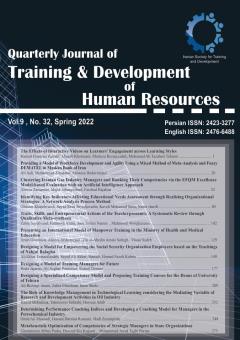Designing a Curriculum Model for the Development of Elementary School Teachers of the Iran's Educational System
Subject Areas :
mohsen abdolahi
1
,
Mahbubeh Arefi
2
,
KOUROSH FATHI VAJARGAH
3
,
Abasalt Khorasani
4
![]()
1 - Ph.D. Student, Shahid Beheshti University
2 - Associate Professor of Curriculum Studies, Shahid Beheshti University
3 - Professor of Curriculum Studies, Shahid Beheshti University
4 - Associate Professor of Curriculum Studies, Shahid Beheshti University
Keywords: Teachers development, curriculum model, elementary school, grounded theory approach.,
Abstract :
The main purpose of this study was to design a Curriculum Model for the Development of Elementary School Teachers of the Iran's Educational System. This study used a qualitative research approach and was conducted based on the classical grounded theory. The statistical population consisted of Faculty members and experts in the field of Teachers development that was selected through snowball sampling. A total of 21 people, including 14 Faculty Members and 7 Teachers development specialists, were interviewed. Semi-structured interviews were used to collect data. The data from interviews were analyzed during three stages of open, selective and theoretical coding, and the conceptual model was formed based on the drawing of the ratio between the main categories or elements of the Teachers development curriculum. The conceptual model was formed as follows: causes and necessity (achieving the goals of the educational system, updating teacher skills, complex and flexible teacher role, reform, teacher growth and improving student learning), principles and conditions (teacher-centered, continuity and Sustainability, school-centered and job-oriented, content-oriented and based on student needs), components (content, context and process), correlated factors (personal, environmental, importance and priority, quantity, quality and time) and outcomes (teachers, Programs and students). To ensure validity and reliability, Guba and Lincoln approaches were used, including: acceptability, transferability, reliability and verifiability. Finally, based on the findings and results, guidelines for the implementation of the program are provided.
1. Ahmadi A. General characteristics, curriculum and course titles of undergraduate courses in the field of educational sciences, majoring in primary education. 2015. Tehran: farhangian University.
2. Mirsepasi N. Strategic Management of Human Resources and Labor Relations. 2010. Tehran: Mir Publication.
3. Poursalim A, Arefi M, Fathi Vajargah K. Designing a Curriculum Model for the Global Citizenship Education in Elementary Schools of Iran: A Grounded-Theory based Model. New Thoughts on Education Faculty of Education and Psychology,Al-Zahra University. 2017; 13 (9):7-38.
4. Widayati A, MacCallum J, Woods-McConney A. Teachers’ perceptions of continuing professional development: a study of vocational high school teachers in Indonesia. Teacher Development. 2021;25(5): 604-621, DOI: 10.1080/13664530.2021.1933159. https://doi.org/10.1080/13664530.2021.1933159
5. Näkk A, Timoštšuk I. In pursuit of primary teachers’ work motivation amid increased external neoliberal pressure in education. Teacher Development. 2021;25(5):585-603, DOI: 10.1080/13664530.2021.1899040 To link to this article: https://doi.org/10.1080/13664530.2021.1899040
6. Abdollahi B, Tavakoli A, Youseliani Gh. Identifying and validating the professional competencies of effective teachers. Quarterly Journal of Educational Innovations.2014;13(49):25-48.
7. Karimi, F. Study of professional qualifications of primary school teachers. Quarterly Journal of Leadership and Educational Management, Islamic Azad University, Garmsar Branch. 2008;4(6):151-166.
8. Engida, Temechegn. ICT-enhanced Teacher Development Modelm, UNESCO-IICBA. 2011. Addis Ababa. Ethiopiam.
9. UNESCO, ICT COMPETENCY FRAMEWORK FOR TEACHERS. 2011. United Nations Educational, Scientific and Cultural Organization.
10. Fathi Vajargah, Kourosh. In-service training planning for staff. 2019 Tehran: SAMT Publication.
11. Farmer, S, Childs A. Science teachers in northern Scotland: their perceptions of opportunities for effective professional learning. Teacher Development. 2021;25(5):1-21. https://doi.org/10.1080/13664530.2021.1989481
12. OECD. Creating Effective Teaching and Learning Environments First Results from TALIS. 2009. Organisation for Economic Co-operation and Development.
13. Fransson G, Norman F. Exploring how a digitally skilled teacher’s self-understanding influences his professional learning strategies. A research cooperation between a teacher and a researcher. Teacher Development. 2021;25(4):432-448. https://doi.org/10.1080/13664530.2021.1891131
14. Saki R. Curriculum Research. 2015. Iranian Curriculum Encyclopedia.
15. Harwell S. Teacher Professional Development: It’s Not an Event, It’s a Process. 2003. CORD Publication.
16. Ghanizadeh Graili M, Jafari P, Ghorchian N. The Impact of improving professional competencies on teachers’ developing at high school (second period) in Tehran. Managing Education in Organizations. 2017;6(1):51-72.
17. Kohandel M, Karami M, Ahanchian M, MehrMohammadi M. Representation of the controversies over the two discourses of professional development and the professional identity of the teacher from the perspective of power relations. Journal of Fundamentals of Education. 2018;8(2):103-122.
18. Hosseinian B, Nili M, Sharifi F. A Comparative Study of the Dimensions of Primary Teacher Professional Development Programs in Iran and Selected Countries, Quarterly Journal of Research in Educational Systems. 2020;14 (49): 73-90.
19. Hejazi Y, Pardakhtchi M, Shahpasand M. Teacher Professional Development Approaches. 2009. University of Tehran Publication.
20. Browne L, Defty C, Guo N, Hou K, Wang D, Zhuang L. Proposing an internationally focused typology to measure the impact of CPD for teachers – the Chinese internationalisation project. Teacher Development. 2021;25(9):1-18. https://doi.org/10.1080/13664530.2021.1979092
21. Taheri M, Arefi M, Pardakhtchi M, Ghahremani M. Exploring the process of professional development of teachers in teacher training centers: Foundation Data Theory. Quarterly Journal of Educational Innovations. 2013;12(45):149-176.
22. Samiei Zafarghandi Morteza. Methods of completing and improving the system while serving teachers. Quarterly Journal of Educational Innovations. 2011;39(10):151-177.
23. General policies to create change in the education system .2013. Communication from the Supreme Leader.
24. Document of Fundamental Transformation of Education. 2011. Supreme Council for Cultural Revolution.
25. Articles of Association of Farhangian University. 2011. Supreme Council for Cultural Revolution.
26. Merriam Sh, Tisdel E. Qualitative research; A Guide to Design and implementation. translated by Alireza Kiamanesh and Maryam Dana Toos. 2019. Tehran: SAMT Publication.
27. Gall M, Borg W. Gall J. Quantitative and qualitative research methods in educational sciences and psychology (translated by Nasr Esfahani et al.). 2017 . Tehran: SAMT Publication.
28. Creswell J, Miller D. Determining Validity in Qualitative Inquiry. Theory into Practice. 2000;39(3):124–30. Available online at: http://www.jstor.org/stable/1477543
29. Aghili, S, Alam al-Huda J, Fathi Vajargah K. Designing a curriculum model for moral education in the Elementary school of the Iran's Educational System. Journal of Research in Teaching. 2018;6(4):1-23.
30. Bazargan A. Introduction to qualitative and mixed research methods. 2011. Tehran: didar Publication.


